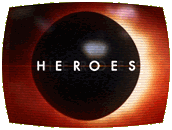Liberation Day
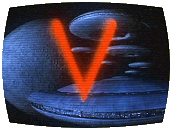 Martin spots Diana’s escaping fighter and alerts Donovan, who jumps into another Visitor fighter and forces her down in a remote valley on Earth. She tries to escape on foot, but Donovan still captures her.
Martin spots Diana’s escaping fighter and alerts Donovan, who jumps into another Visitor fighter and forces her down in a remote valley on Earth. She tries to escape on foot, but Donovan still captures her.
One year after what is eventually dubbed Liberation Day, the heroes of the resistance are still the focus of international attention, some of it unwanted. Robin can’t keep the media away from Elizabeth, whose powers and role in the liberation of Earth remain the source of much speculation. Mike Donovan has returned to his job as a TV news cameraman, and has even landed Martin, who remains on Earth, a job as his sound man. Julie, now working for a corporation called Science Frontiers, is still trying to crack the secrets of the captured Visitor mothership, while Nathan Bates, the CEO of the company, is trying to enlist Ham Tyler’s help to wring those secrets out of Diana, who remains imprisoned, awaiting trial. Elias Taylor has started a successful restaurant, where Willie works as a waiter. Every Visitor who has remained on Earth must take pills every 12 hours, or the red toxin, still in Earth’s ecosystem, will slowly kill them. And as she is escorted to her trial, Diana is shot at point-blank range. But as Donovan and Martin try to follow the ambulance carrying her away, they see something suspicious – the ambulance goes under an underpass and doesn’t come out, but an 18-wheeler pulls out instead.
Donovan and Martin trail the truck to a distant hideout where Bates and Tyler plan to force Diana to reveal the secrets of Visitor technology. Martin knocks Donovan out and tries to carry out Diana’s death sentence himself, but she manages to kill Martin, take his last antidote capsule, and escape. Donovan and Tyler independent follow her to a radio telescope array, which she has used to transmit a homing signal, and a Visitor fighter soon arrives, getting her away from Earth and taking her to a new Visitor fleet waiting behind Earth’s moon.
Season 1 Regular Cast: Marc Singer (Mike Donovan), Faye Grant (Dr. Julie Parrish), Michael Ironside (Ham Tyler), Jane Badler (Diana), Jennifer Cooke (Elizabeth), Robert Englund (Willie), Lane Smith (Nathan Bates), Blair Tefkin (Robin Maxwell), Michael Wright (Elias Taylor), June Chadwick (Lydia), Jeff Yagher (Kyle Bates)
written by Paul Monash
directed by Paul Krasny
music by Dennis McCarthyGuest Cast: Jenny Beck (young Elizabeth), Frank Ashmore (Martin), Michael Durrell (Robert Maxwell), Ed Call (?), Kirk Scott (?)
LogBook entry by Earl Green


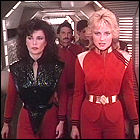 Notes: Though the computer in Julie’s office appears to be an IBM PC variant, its display, when shown in close-up, was generated by an Apple II computer in text mode. Even though Robin and Kyle were both prisoners in the Visitors’ work camp in Breakout, this episode seems to presume that they never met there – which, for the viewing audience, may be just as well since NBC didn’t air the episodes in the intended order, postponing Breakout until 1985, by which point the series had been cancelled. Howard K. Smith is credited, but does not appear in the episode.
Notes: Though the computer in Julie’s office appears to be an IBM PC variant, its display, when shown in close-up, was generated by an Apple II computer in text mode. Even though Robin and Kyle were both prisoners in the Visitors’ work camp in Breakout, this episode seems to presume that they never met there – which, for the viewing audience, may be just as well since NBC didn’t air the episodes in the intended order, postponing Breakout until 1985, by which point the series had been cancelled. Howard K. Smith is credited, but does not appear in the episode.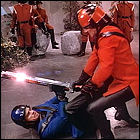 Notes: The Leader’s ability to communicate to and through Elizabeth may be the inspiration for the “bliss” effect used by Visitor leader Anna in ABC’s 21st century remake of V – a slight irony, since this was the final episode of the original V. This episode was written with a cliffhanger that has never been resolved on television or in other media.
Notes: The Leader’s ability to communicate to and through Elizabeth may be the inspiration for the “bliss” effect used by Visitor leader Anna in ABC’s 21st century remake of V – a slight irony, since this was the final episode of the original V. This episode was written with a cliffhanger that has never been resolved on television or in other media.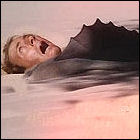 Notes: This episode, with its numerous graphic deaths – Visitors mauled to death by dogs, the victims of the alien sandworm, Ham Tyler’s habit of dispatching his opponents with brutal martial arts moves – was rejected during V’s original run, appearing only in post-season reruns after the series had already been cancelled. Its omission in the original intended running order interrupted a closely-linked quartet of stories that set up the landscape for the rest of the season. With Breakout dropped, the next episode (The Deception) opens with Robin wandering through southern California for no readily apparent reason (she had just escaped from the prison camp).
Notes: This episode, with its numerous graphic deaths – Visitors mauled to death by dogs, the victims of the alien sandworm, Ham Tyler’s habit of dispatching his opponents with brutal martial arts moves – was rejected during V’s original run, appearing only in post-season reruns after the series had already been cancelled. Its omission in the original intended running order interrupted a closely-linked quartet of stories that set up the landscape for the rest of the season. With Breakout dropped, the next episode (The Deception) opens with Robin wandering through southern California for no readily apparent reason (she had just escaped from the prison camp).

 Cast: Max Wright (Willie Tanner), Anne Schedeen (Kate Tanner), Andrea Elson (Lynn Tanner), Benji Gregory (Brian Tanner), Liz Sheridan (Mrs. Ochmonek), John LaMotta (Mr. Ochmonek), Frank McCarthy (Army Officer)
Cast: Max Wright (Willie Tanner), Anne Schedeen (Kate Tanner), Andrea Elson (Lynn Tanner), Benji Gregory (Brian Tanner), Liz Sheridan (Mrs. Ochmonek), John LaMotta (Mr. Ochmonek), Frank McCarthy (Army Officer)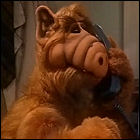 Cast: Max Wright (Willie Tanner), Anne Schedeen (Kate Tanner), Andrea Elson (Lynn Tanner), Benji Gregory (Brian Tanner), Larry Hankin (Burglar), Lisle Wilson (Policeman), Marc Levine (Pizza Delivery), Liz Sheridan (Mrs. Ochmonek), John LaMotta (Trevor Ochmonek)
Cast: Max Wright (Willie Tanner), Anne Schedeen (Kate Tanner), Andrea Elson (Lynn Tanner), Benji Gregory (Brian Tanner), Larry Hankin (Burglar), Lisle Wilson (Policeman), Marc Levine (Pizza Delivery), Liz Sheridan (Mrs. Ochmonek), John LaMotta (Trevor Ochmonek)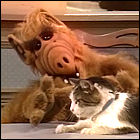 Cast: Max Wright (Willie Tanner), Anne Schedeen (Kate Tanner), Andrea Elson (Lynn Tanner), Benji Gregory (Brian Tanner), Darwin Joston (Dogcatcher), Carrie Lorraine (Heidi), Jed Mills (Heidi’s Dad)
Cast: Max Wright (Willie Tanner), Anne Schedeen (Kate Tanner), Andrea Elson (Lynn Tanner), Benji Gregory (Brian Tanner), Darwin Joston (Dogcatcher), Carrie Lorraine (Heidi), Jed Mills (Heidi’s Dad)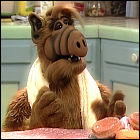
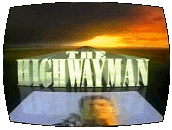
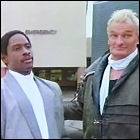 written by Glen A. Larson
written by Glen A. Larson

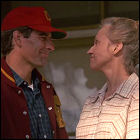 Cast: Scott Bakula (Dr. Sam Beckett / John Beckett), Dean Stockwell (Al), David Newsom (Tom Beckett), Olivia Burnette (Katie Beckett), Hannah Cutrona (Mary Lou), Mai-Lis Kuniholm (Lisa Parsons), Caroline Kava (Thelma Beckett), Mik Scriba (Coach Donnelly), Niles Brewster (Dr. Berger), Matthew John Graeser (Herky), Ethan Wilson (Sibby), John L. Tuell (No Nose Pruitt), Adam Affonso (young Sam)
Cast: Scott Bakula (Dr. Sam Beckett / John Beckett), Dean Stockwell (Al), David Newsom (Tom Beckett), Olivia Burnette (Katie Beckett), Hannah Cutrona (Mary Lou), Mai-Lis Kuniholm (Lisa Parsons), Caroline Kava (Thelma Beckett), Mik Scriba (Coach Donnelly), Niles Brewster (Dr. Berger), Matthew John Graeser (Herky), Ethan Wilson (Sibby), John L. Tuell (No Nose Pruitt), Adam Affonso (young Sam)